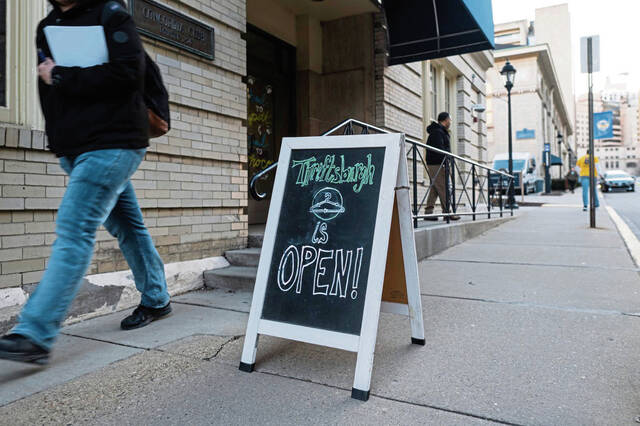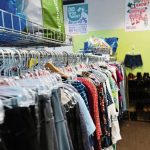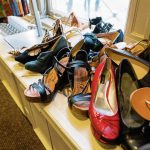Browsing through Goodwill in Cheswick, Brooke Holler was sizing up a wooden easel she was hoping would make a nice stand for a sign at her wedding in September.
Holler isn’t just an avid thrifter — she turned her passion into a business. She runs Busy Bee’s on the secondhand online platform Poshmark. The 4-year-old business began when she realized she could turn her clothing addiction into a business.
“My mom loves thrift shopping. She and I would go to Goodwill every Sunday,” she said. “When I was in college, and everyone is strapped for cash, I found Poshmark.”
The popularity of thrifting goes beyond taking it easy on the bank account. For a lot of shoppers, it’s about finding something unique. It’s also about being aware of sustainability and consumption. And, spending more time at home during the pandemic, people got to evaluate what’s in their homes, leading a lot of folks to purge their closets and reconsider their purchases.
Goodwill likes to call the draw to wander through secondhand stores the “treasure hunt.”
“Customers are looking for a deal; they’re looking for value,” said Kevin Akans, director of retail distribution and salvage operations at Goodwill of Southwestern Pennsylvania.
Akans said more people are turning to secondhand stores as they get more conscious of their budgets.
“Your dollar goes further at Goodwill,” Akans said of the nonprofit serving eight counties in the region — Allegheny, Armstrong, Butler, Beaver, Fayette, Greene, Washington and Westmoreland. “More people are open to wearing a gently used garment.”
In a recent series of ads, Levi’s has been promoting how durable its denim is. Its website has a link for people to trade in their jeans through Levi’s SecondHand, meant to “keep coveted denim in circulation and out of landfills.”
Over the past few years, the 170-year-old company has been promoting its “Buy Better, Wear Longer” campaign to raise awareness about overconsumption in the apparel industry and buying clothes that will last. It also has guides on how to repair and repurpose those boot cut jeans that you just can’t part with.
Some public names are praising buying resale, as well.
Gisele Fetterman has been very open about her secondhand wardrobe and wore a $12 thrifted dress to husband Sen. John Fetterman’s swearing-in on Capitol Hill in January.
Beyond well-known nonprofits like Goodwill, the Salvation Army and St. Vincent de Paul, publicly traded companies like thredUp and Poshmark have capitalized on the growing secondhand apparel market.
ThredUp forecasts the U.S. secondhand market to more than double by 2026, reaching $82 billion. One big factor in that growth is how technology and online marketplaces have made it easier to shop.
ThredUp expects more retailers will embrace some kind of secondhand model.
“Brands and retailers are driving the next wave of secondhand,” James Reinhart, thredUP co-founder and CEO, said in a 2022 report. “In fact, brands with their own resale shops increased 275%, from eight in 2020 to 30 in 2021. We are still in the very beginning of this trend, but the acceleration of resale adoption is a positive signal with enormous benefits for the planet.”
A student-led effort
At any given college campus, where students are often strapped for cash and are moving in and out of dorms a lot over the course of four years, there is a big opportunity for reusing and recycling.
Students at the University of Pittsburgh in Oakland started their own secondhand store, dubbed the University of Thriftsburgh. T-shirts and pants sell for $5, outerwear and professional clothes for $10. Thriftsburgh, which was founded in 2014 on campus, is open to the public. It has a fall rummage sale that also includes dorm essentials. In 2022, it was able to rehome 7,000 pounds of items over four days, it’s biggest year yet, according to Melissa Bilec, co-director of Pitt’s Mascaro Center for Sustainable Innovation and Covestro Circular Economy Program.
“One of the reasons why textiles is so important is when you think of some of the waste streams we have — we have recycling for certain kinds of plastics and glass, many of us have composting opportunities — the textile sector really doesn’t have a dedicated waste stream. Most of the textiles will go to the to the landfill,” Bilec said. “So the opportunity to have this on a campus is really unique.”
But there’s always a point where a piece of clothing isn’t fit to donate. Pitt has set up bins for such items to be recycled. Since 2018, it had diverted 30 tons of textiles from landfills.
Supporting a mission
For some thrifty shoppers, another factor bringing them into stores is how revenue is used. For both Goodwill and the Salvation Army, proceeds from the stores go toward their missions.
For Goodwill of Southwestern Pennsylvania, store revenue supports job training and education programs. The agency has more than 1,400 employees and annual revenue of nearly $50 million.
The Salvation Army Western PA Division uses store revenue for adult rehabilitation programs. It has locations throughout the region, including North Apollo, South Side, West Mifflin, North Huntington and Latrobe.
“Traffic at our stores really does go with the economy,” said Maj. Mark Unruh, administrator of Adult Rehabilitation Center and thrift stores.
When the economy is tough, customers pick up, he said.
“But, sadly, that means donations usually fall.”















